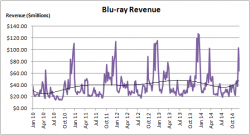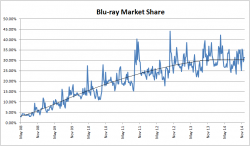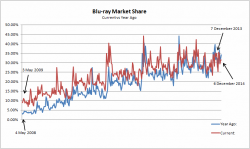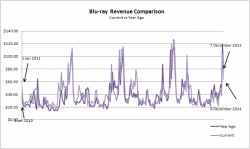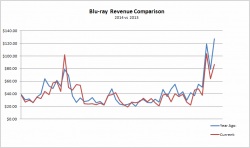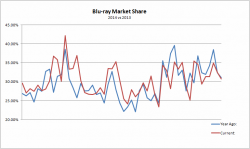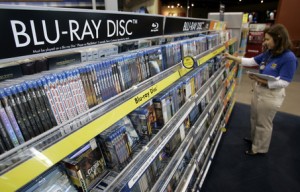My main workhorse computer (more and more just a glorified web browser these days, considering how ever app has moved online, and how little gaming I do these days) is starting to show signs of strain, and so it’s time to get something new. The matter is made more complicated by the fact that I also need a new laptop. So I thought, why not combine these two requirements, add in the (more want than) need for a new Windows tablet, and get the Surface Pro 3, plus the dock, and use that as my desktop replacement. It’s not going to play any serious games (games consoles are a much more economical choice for it these days, or a dedicated gaming PC for those that have the time and money to devote to such a beast and its time consuming ways), but it will be more than enough for work, and work can be taken away by me in both tablet form, or laptop form with the optional (but really should be standard) Type Cover accessory. Some light gaming may also be included.
I opted for the i7/256GB/8GB RAM model, since this is a business purchase and end of financial year, tax deductions blah blah blah – but most will find the i5/128GB/4GB RAM model more than adequate.
I may live to regret my decision, especially given the high cost of the SP3, but it’s hard to justify spending money on a gaming PC when my current 6 year old PC can still do a semi-decent job at medium quality levels, and when I haven’t played a PC game in about 6 months. And an Ultrabook or Macbook Pro with the same portability as the SP3 won’t cost much less, and does not transform into a tablet.
A gaming PC might still be on the table, but it will probably be one that I will build from scratch, part by part, just for the fun of it.
Time will tell if I’ve made the right decision.
Oh yeah, news stuff.
![]()
Dragons, nudity, death of a beloved character. These are things synonymous with HBO’s Game of Thrones. Piracy, record, smashed – these are also words associated with the hit TV show. And the season 5 premier is no different. Well actually, it is different, and it is a lot worse!
The good news is that the piracy record wasn’t broken this time, but that was only because the first four episodes of the show was leaked prior to the show’s debut, catching HBO and pirates alike off-guard. As downloaders slowly trickled into the swarms, it soon became a downloading frenzy, but the spread out nature of the downloads meant that, technically, no records were broken (and I’m sure if the download totals over a week from after the pre-release leaks were released was ever calculated, I’m sure records will have been broken).
So it’s bad to worse for HBO, which to their credit, tried really hard this time to reduce the incentive to pirate by making new episodes available worldwide simultaneously, and by launching the standalone streaming product HBO Now. The pre-release leak is particularly worrying, and it should prompt HBO to tighten up security for screener copies being sent to reviewers (unique visual and digital watermarks for each copy might be something HBO needs to consider).
One thing they could do is to make HBO Now available outside of the U.S. For example, in Australia, where users have tried to sign up using VPN/smart DNS services, but are now apparently being banned. This will be difficult not just in Australia but all around the world due to HBO’s deals with local pay TV operators, many of whom have locked up HBO programming in exclusive deals, in order to protect their premium pricing model. Piracy is the inevitable result.
Ironically, it’s this kind of piracy that is causing Netflix to drop their prices. Apparently, Netflix sets pricing for their international subscriptions based on that country’s piracy rate – the more pirated downloads, the cheaper their service will be. Netflix says that this is because they’ve positioned their service as a competitor to piracy, and as a result, they cannot ignore the reality of piracy. Or at the very least, they don’t treat piracy as something that can be easily eradicated and devote all their resources to combat piracy based on this false believe.
It’s this false believe that’s the driving force behind the urgency to change copyright laws in Australia to deal with the piracy scourge. Change that apparently is headed not by the local film industry, but by Hollywood lobbyists, many of whom have never set foot in Australia. According to the latest leaked Sony documents published by Wikileaks, much of the US based effort is being channeled via local Village Roadshow co-chairman Graham Burke. Local film studio Village Roadshow is infamously known as the company that compared movie downloads to “terrorism or paedophilia”, and believes in the possibility of “total eradication” of piracy as the end-goal.
Good luck with that!
![]()
Changes are-a-coming for The Simpsons, and it could be the end of an era. No, Fox isn’t cancelling the iconic animated show, but they are cancelling the DVD and Blu-ray releases for it. Bad luck for collectors, who should have season 1-17, and season 20, on disc, but will no longer be able to continue adding to their collection.
Both Fox and Al Jean, the Simpsons’ showrunner, blames the “collapse of DVD market and rise of downloads” for the decision, with Jean also apologising to fans outside of North America for the digital option, such as Fox’s streaming service FX Now, being not available in most places.
Regular followers of our Blu-ray/DVD sales report will already know that DVD sales have been declining steadily for years, while Blu-ray sales have also started to stall recently. Most of the business is going to the digital side of things, from iTunes, to Hulu Plus to FX Now (all places where you can watch The Simpsons), so Fox’s decision is understandable, even if, once more, overseas fans lose out.
![]()
Fox’s move may be signalling the end of discs, Nintendo may also be signalling the end of the Wii U. With the delay of Zelda that I mentioned here a couple of issues ago, the announcement of the Wii U’s successor, the Nintendo NX, barely 2 years into the console’s lifespan, and with the number of announced titles shrinking all the time, Nintendo may have finally decided that the Wii U isn’t going to cut it anymore in the face of stern competition from the PS4 and the Xbox One.
So the new Zelda game could very well end up having the same fate as the last Zelda game, Twilight Princess, which was originally meant for the GameCube, only to be delayed so that it could be simultaneously released on the Wii as well.
And let’s hope Nintendo don’t mess up the NX the same way they “messed up” the Wii U. While the Wii U was by no means a complete failure, the fact that it wasn’t a huge improvement on the last gen, and clearly behind the current gen, arrived at a relatively high price with few third-party game support, and with Nintendo failing to properly demonstrate how gaming on the Wii U would be better and more fun (even though, albeit subjectively speaking, it should be). Release a console that’s more powerful than the PS4/Xbox One, had all the “family fun” stuff that Nintendo is famous for, add in a sprinkle of first-party must-haves close to release (Mario, Mario Kart, Zelda …), and then ensure there are plenty of third-party exclusive worth mentioning, and Nintendo may be onto another winner. And from the perspective of someone who writes this particular blog and its main topics of discussions, maybe ensuring the Wii U is also a competent media player would also be a good idea(Blu-ray preferred, but should at least support all the streaming apps, plus local/network based media playback/streaming).
——
The March NPD results do not reveal any surprises at all. The PS4 once again beat the Xbox One for first place, with the Wii U in a distant third (probably). It’s probably not even worth mentioning the NPD results every month anymore, unless something strange happens, like the Xbox One finally managing to beat the PS4 (might happen, but Microsoft will need bigger price cuts and better exclusives to make it a consistent thing, as opposed to just during holiday discounting).
——
It’s unlikely that, by this time next week, I’ll be writing the WNR on my new SP3. Unlikely because it will take a while to get everything installed, set up and transferred in time. Ah, the simultaneous joy and pain of a new PC setup. See you next week.






